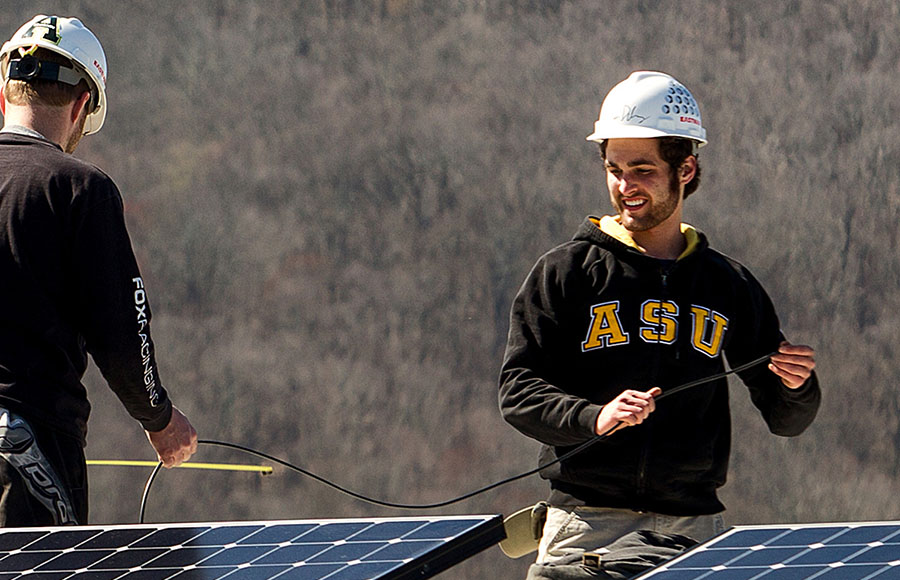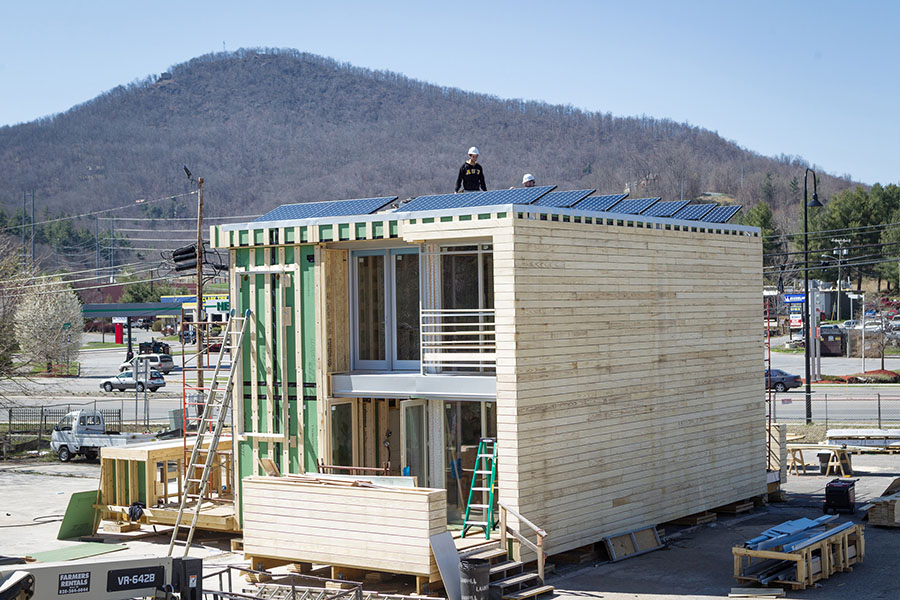BOONE, N.C. — Thirty-four students from Appalachian State University will soon begin packing for a 4,000-plus mile trip to Versailles, France. But before they pack their luggage, they first have to prepare their 1,200-square foot house for the Solar Decathlon Europe 2014 competition.
The six, 40-foot modules that comprise the house called Maison Reciprocity will leave Boone April 27 on flatbed trailers for Charleston, S.C., where they will be loaded onto a cargo ship for the two-week journey across the Atlantic. When the modules arrive in Versailles, the students will have 10 days to reassemble the structure for the two-week competition.
Led by nine graduate student managers, approximately 50 students have been involved in the primary design and construction of the home in conjunction with their international partners at the Université d’Angers in France.
The two-bedroom, two-bath row dwelling is comprised of three components. The “Urban Shell” is an energy-efficient structural envelope constructed of cross-laminated timber, an engineered wood-building system, and continuous exterior layers of polyisocyanurate and rock wool insulation.
The “CHORD” is an integrated building systems core, housing all plumbing, mechanical and electrical systems that service the home.
The “Living Brise-Soleil” is an innovative take on the traditional exterior sun screen (brise soleil in French) where off-the-shelf claddings and renewable systems, such as photovoltaic panels, are used to create an outer “skin” that produces energy and protects the structure.
Only one other entry from the U.S. was selected for the international competition – a design by Rhode Island School of Design and Brown University and their international partner, the University of Applied Sciences of Erfurt in Germany. A total of 20 projects representing 16 countries will be exhibited on the palace grounds of the Chateau de Versailles this summer.
Maison Reciprocity is the second Appalachian design to compete in a Solar Decathlon event. Appalachian last competed in the U.S. Department of Energy’s 2011 Solar Decathlon with its Solar Homestead design.
“Form wise, they are two very different designs,” said Dr. Jamie Russell, an assistant professor in the building science program in Appalachian’s Department of Technology and Environmental Design and the team’s faculty director.
“The Solar Homestead was a celebration of the frontiers and the homesteaders who came to this area,” he said. “Maison Reciprocity is a very urban design. It’s meant to be a three-or four-story row house that would be packed into a fairly dense urban situation, with two stories of living space, an open terrace roof and one floor of commercial space.”
Students from Appalachian’s Department of Technology and Environmental Design programs in building science, interior design and appropriate technology led the design effort. The project garnered interdisciplinary participation as well.
“We tried to broaden that net as wide as we could,” Russell said of the student involvement in the project. “A graphic design class worked on an iPad app for us. Another graphic design class developed our logo. We had graduate students from the physics department create, design and built our entire control system. We have students from across campus working on the project.”
Appalachian and Angers have participated in student and faculty exchanges for 30 years. The university is known for its expertise in the global/life cycle costs of buildings, construction safety, landscape design, whole building automation, sustainability, aging in place, indoor air quality, exhibition planning and docent training, and 3-D virtual reality models and tours.
Weekly teleconferences with student and faculty at Angers provided direction in terms of building code requirements. “We have to follow U.S. code and also French building code so they have been a great help, especially in understanding the French electrical code which is very different from ours,” Russell said.
Students from Angers will work with Appalachian students to lead tours during the competition, design and provide dual language signage and provide landscaping for the competition site. “Our French partners also are working to sell the house to a social housing company as a demonstration or exhibition unit,” Russell said.
The house will be exhibited in Versailles June 27 – July 12. Lead sponsors of the project are Eastman Chemical Company, NAPCO, Simpson Strong Tie, Yale Carolinas, Yale industrial equipment companies, Appalachian’s student-run Renewable Energy Initiative, Murray Supply Company, Ply Gem, ROXUL, Mediterranean Shipping Company and Global Shippers Association.
For more information about Maison Reciprocity, visit http://reciprocity2014.com. For information about the international competition, visit http://www.solardecathlon2014.fr/en.
What do you think?
Share your feedback on this story.
About Appalachian State University
As a premier public institution, Appalachian State University prepares students to lead purposeful lives. App State is one of 17 campuses in the University of North Carolina System, with a national reputation for innovative teaching and opening access to a high-quality, cost-effective education. The university enrolls more than 21,000 students, has a low student-to-faculty ratio and offers more than 150 undergraduate and 80 graduate majors at its Boone and Hickory campuses and through App State Online. Learn more at https://www.appstate.edu.













